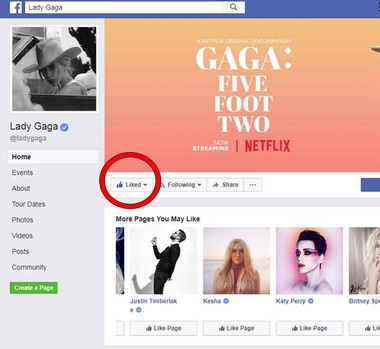Just a few "likes" on social media can out you

Have you liked Barack Obama, Lady Gaga and the Human Rights Campaign on your Facebook page? If so, Facebook is probably inferring that you are LGBT+. That allows you to be targeted with LGBT+ ads, whether you want them or not.
That is the conclusion of a study from researchers at Columbia Business School, Northeastern University and New York University. The study was published in the journal Big Data.
“Successful pricing strategies, marketing campaigns, and political campaigns depend on the ability to optimally target consumers and voters,” the study says in its introduction. “This generates incentives for firms, political parties, and governments to exploit information related to people’s personal characteristics, such as their gender, marital status, religion, sexual or political orientation, and personality.”
But personal characteristics are hard to determine, depending on how much information people provide in their online profiles.
“As a result, online marketers increasingly depend on statistical inferences based on available information. A predictive model can be used to give each user a score that ranks users by the estimated probability of having a certain personal trait, such as being gullible, introverted, female, a drug user, or gay.”
It doesn’t take a lot of likes to reach the conclusion that a person is gay or lesbian, the report discovered.
“Researchers found that as few as three likes on the social network can be the difference between advertisers being able to identify users as gay or not for targeting purposes. This was the case even when users had deliberately withheld such information from Facebook,” reported Telegraph.co.uk.
The study proposed that social networks introduce a “cloaking” system that allows users to prevent inferences, even if they are true.
Social media networks such as Facebook are unlikely to provide this kind of system. In addition, the study indicates that simple changes in modeling systems could make cloaking more difficult. The researchers even present those changes in the study.
“We demonstrate a simple modeling change that requires users to cloak substantially more information to affect the inferences drawn. The upshot is that organizations can provide transparency and control even into complicated, predictive model-driven inferences, but they also can make control easier or harder for their users.”
Researchers “used data from 164,883 U.S. Facebook users,” according to LGBTQNation.com. “The researchers knew some traits about those people (like if they’re gay, they smoke, or they’re Muslim) based on their profiles and their responses to a survey, and they knew those users’ likes.
“They worked backwards to see how effective cloaking was. They built a model that used a person’s likes to find out how likely it was that they had a certain trait. Then they blocked individual likes from each user from being used in the model to see how many needed to be blocked to keep the model from making an inference about the user.
“Being a gay man was one of the traits they examined. The researchers found that, if the average gay man chose right, he would only need to cloak eleven likes to keep their model from inferring that he’s gay. That’s only 7.4 percent of his total likes.
“The average lesbian would need to remove fewer likes – only six, or 3.5 percent of her total likes.”
But a problem remains. LGBTQNation observes, “The thing is, we are already leaving a huge amount of information about ourselves online that can be analyzed with software that’s not sophisticated at all. It wouldn’t be too hard for a motivated oppressive regime to put together a list of gay people right now.”
Copyright The Gayly – November 24, 2017 @ 3:10 p.m. CST.





